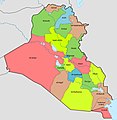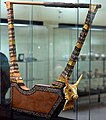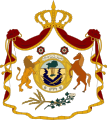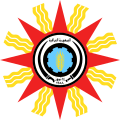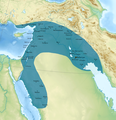
Back بوابة:العراق Arabic প্রবেশদ্বার:ইরাক Bengali/Bangla دەروازە:عێراق CKB Portal:Irak Spanish Portail:Irak French Portal:Iraq Malay Portal:Iraque Portuguese Портал:Ирак Russian Portal:Irak Turkish باب:عراق Urdu
The Iraq PortalA view of Erbil, Iraq
Iraq, officially the Republic of Iraq, is a country in West Asia and a core country in the geopolitical region known as the Middle East. With a population of over 46 million, it is the 35th-most populous country. A federal parliamentary republic, it consists of 18 governorates. Iraq is bordered by Turkey to the north, Saudi Arabia to the south, Iran to the east, the Persian Gulf and Kuwait to the southeast, Jordan to the southwest, and Syria to the west. The capital and largest city is Baghdad. Iraqi people are diverse; mostly Arabs, as well as Kurds, Turkmen, Yazidis, Assyrians, Armenians, Mandaeans, Persians and Shabakis with similarly diverse geography and wildlife. Most Iraqis are Muslims – minority faiths include Christianity, Yazidism, Zoroastrianism, Mandaeism, Yarsanism and Judaism. The official languages of Iraq are Arabic and Kurdish; others also recognized in specific regions are Turkish, Suret, and Armenian. Modern Iraq dates back to 1920, when a British-backed monarchy under Faisal was established, followed by an independent Kingdom in 1932. It was overthrown in 1958 by General Qasim, who established and ruled a republic until he was overthrown in 1963. Iraq was then ruled by brothers Abdul Salam Arif and Abdul Rahman Arif. The Ba'ath party took power in a 1968 coup, first led by Ahmed Hassan al-Bakr and then by Saddam Hussein. Under Saddam, the country fought the Iran–Iraq War and the Gulf War. In 2003 United States-led coalition forces invaded and occupied Iraq, overthrowing Saddam's regime. The war continued as an insurgency and sectarian civil war, which lasted until 2011. Continuing discontent over Nouri al-Maliki's government led to protests, after which a coalition of Ba'athist and Sunni militants launched an offensive against the government, initiating full-scale war in Iraq. The climax of the campaign was an offensive in Northern Iraq by the Islamic State (ISIS) that marked the beginning of the rapid territorial expansion by the group, prompting an American-led intervention. By the end of 2017, ISIS had lost all its territory in Iraq. Iran has also intervened and expanded its influence through sectarian Khomeinist militias. Post-war conflict continues at a lower scale to this day. (Full article...) Selected article -The COVID-19 pandemic in Iraq was a part of the worldwide pandemic of coronavirus disease 2019 (COVID-19) caused by severe acute respiratory syndrome coronavirus 2 (SARS-CoV-2). During the pandemic, Iraq reported its first confirmed cases of SARS-CoV-2 infections on 22 February 2020 in Najaf. By April, the number of confirmed cases had exceeded the hundred mark in Baghdad, Basra, Sulaymaniyah, Erbil and Najaf. As of 7 April 2020, officially 28,414 tests have been done in Iraq as a whole (including the Kurdistan Region), with 1202 of them turning out positive. Of those tests, 12,143 were done by the Kurdish Ministry of Health, which means that the other 16,271 were done by the Iraqi Ministry of Health. While 0.25% of the Kurdistan Region's population has been tested, only 0.05% of the rest of the country has been tested, thus highlighting the possible disparity between total positive case numbers between regions. Iraq is considered "especially vulnerable to the epidemic due to being ravaged" – by war and United Nations sanctions, and by sectarian conflict over the past three decades. (Full article...)Selected picture
Shanidar Cave, where the remains of eight adults and two infant Neanderthals were found Did you know...
Selected biography -Sargon of Akkad (/ˈsɑːrɡɒn/; Akkadian: 𒊬𒊒𒄀, romanized: Šarrugi), also known as Sargon the Great, was the first ruler of the Akkadian Empire, known for his conquests of the Sumerian city-states in the 24th to 23rd centuries BC. He is sometimes identified as the first person in recorded history to rule over an empire. He was the founder of the "Sargonic" or "Old Akkadian" dynasty, which ruled for about a century after his death until the Gutian conquest of Sumer. The Sumerian King List makes him the cup-bearer to King Ur-Zababa of Kish. (Full article...)
General imagesThe following are images from various Iraq-related articles on Wikipedia.
ListsTopicsCategoriesRelated portalsReligions in Iraq States Other states WikiProjectsThings you can do
Associated WikimediaThe following Wikimedia Foundation sister projects provide more on this subject:
Discover Wikipedia using portals | ||||||||
© MMXXIII Rich X Search. We shall prevail. All rights reserved. Rich X Search










